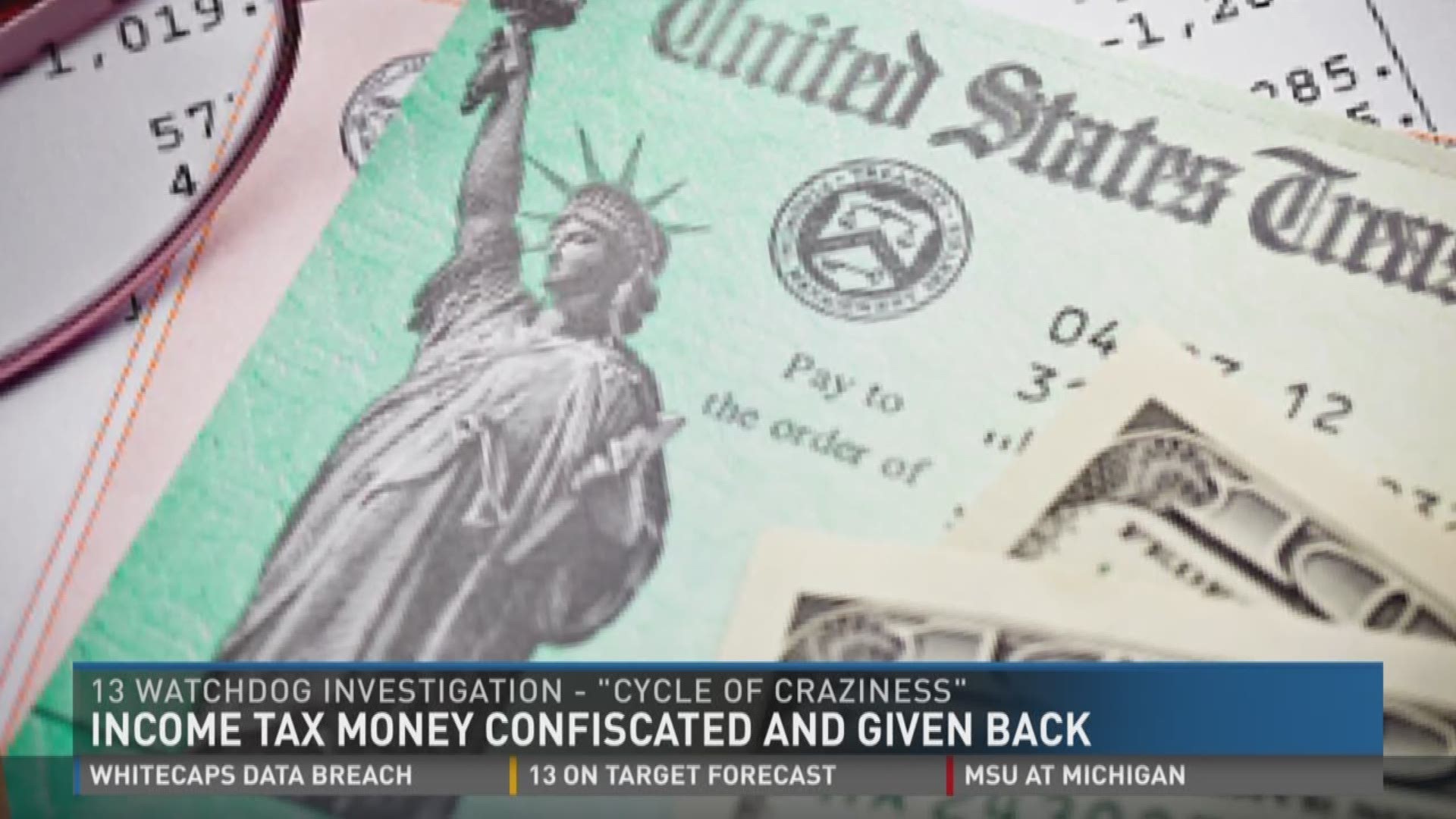Michigan's unemployment agency confiscates money from innocent ID theft victim
A months-long WZZM 13 Watchdog investigation found a local woman among many people in the state of Michigan victimized by identity theft and unable to gain the trust of Michigan's Unemployment Insurance Agency, or UIA.

A months-long WZZM 13 Watchdog investigation found a local woman among many people in the state of Michigan victimized by identity theft and unable to gain the trust of Michigan's Unemployment Insurance Agency, or UIA.
The identity theft caused Michigan's UIA to incorrectly confiscate income tax return money from innocent people who had never filed for unemployment.
Our investigation comes one day after the state of Michigan received some good news from the state of Florida where the FBI there arrested two people in connection with filing fraudulent unemployment benefit claims in Michigan.
The arrests are key for federal authorities and for the state's beleaguered Unemployment Insurance Agency to fight the on-going problem of identity theft.
DAVE AND CHRISTINE AUSTIN
Somebody filed for unemployment benefits using the name, social security number and birth date of Christine Austin's husband Dave Austin. His employer indicated to him that a claim had been filed and it was immediately apparent that somebody filed it fraudulently in his name.
Christine Austin reported the situation immediately to the UIA and also reported it to the Ottawa County Sheriff's Office out of concern her husband's identity had been stolen.
Austin indicated customer service representatives at the UIA told them multiple times at the beginning of the situation not to worry about it and that everything would be fixed.
But month after month, they started receiving letters from the UIA indicating the Austin family had done wrong. The agency seemed to be accusing them of fraud and wanted repayment of the money because Dave Austin didn't qualify for benefits, even though he had never filed a claim. In addition, documents threatened Austin that "intentional misrepresentation to obtain benefits in excess of $3,500 is a felony, and you may be prosecuted in criminal court".
Over a period of nearly a year, the UIA furiously sent out letters to the Austin family. The UIA sent bills to Dave Austin totaling an overpayment of benefits of $1,066 and more than $4,000 in penalties because he had refused to pay them back money he never received.
Christine Austin tried to call the UIA multiple times for her husband but had great difficulties.
"Unfortunately they're not super helpful there," Christine Austin said. "One day I spent 2 1/2 hours on the phone and I really didn't get anywhere with anybody."
Finally Dave Austin visited the local UIA office in Grand Rapids to try to make some sense of the situation and was again told it would be remedied and that the state knew Austin's case was filed fraudulently by somebody else.
"They told us to just ignore the letters and that 'we've got it taken care of and sent it to our fraud department,'" Christine Austin said.
The letters didn't stop, though, and the last one they received blew them away.
"We got a letter from the Treasury Department telling us they had intercepted our taxes," Christine Austin said.
Despite the fact they were told in person by UIA representatives they were "OK" and they were "innocent," the state confiscated their money. They lost a total of $5,400.

The Austin's went into panic mode.
"I was really upset," Christine Austin said. "I had been praying all along somebody would help us."
Austin called the WZZM 13 Watchdog team and we immediately made a call on her behalf to media relations representatives at the UIA who promised us they would remedy the situation.
At the same time, Christine Austin called Gov. Rick Snyder's office for help as well.
Almost immediately, she got her money back.
"It was pretty soon after that we had a check," Austin said.
DEEPER LOOK
It's one thing to solve a problem for a family by rattling cages in Lansing but it's another to fully investigate the situation to find the depth of the issue.
We didn't get an exact number of those who have suffered from this kind of identity theft but it's a certainty it's in the hundreds, if not thousands. Several other people have come forward to us to tell us that what happened to the Austin's, happened to them as well.
Kelvin Miller told us he worked for the same company for 31 years and all of a sudden had a claim filed in his name.
"(My employers) were notified back in November that 'I' had filed a claim for unemployment," Miller wrote in an e-mail to us. "They responded immediately, and it has been a nightmare trying to straighten this out. The letters keep coming in."
The root of the problem is the actual act of the identity theft, and we found, most of the perpetrators are not from this state.
The people taking advantage of folks in Michigan are, largely, based in south Florida. That area has become a "haven" for those committing identity theft. For years, the Sunshine State has had the highest per-person rate of consumer complaints in the nation.
The arrests in Florida were part of a larger sting by the United States Attorney's Office in the Southern District of Florida. More than 100 defendants were charged regarding fraud and theft schemes "involving tens of thousands of stolen personal identities".
Kicksonley Azema, 26, and Abdul Pierrelus, 29, both of North Miami, Fla., were charged in a five-count indictment with conspiracy to commit access device fraud, using unauthorized access devices to fraudulently obtain something valued at $1,000 or more and aggravated identity theft.
An indictment obtained by the WZZM 13 Watchdog team showed Azema and Pierrelus unlawfully used social security numbers of people in Michigan to fraudulently file unemployment claims. They are accused of directing the money to debit card accounts established using the social security numbers of the victims.
Wifredo A. Ferrer, United States Attorney for the Southern District of Florida, commended leaders at Michigan's Unemployment Insurance Agency for helping them in the investigation.
"Law enforcement will not stand by as criminals attempt to disrupt our lives, steal our savings, ravage our credit, and compromise our government benefit programs through calculated and pervasive fraud schemes,” U.S. Attorney Ferrer said.
“Identity theft hurts Michigan residents and is a growing problem for government programs in our state and across the country," Michigan Unemployment Insurance Agency Spokesman Dave Murray said. "We continue to work with the Michigan State Police and federal authorities, and appreciate their ongoing efforts to fight this crime.”
As for Austin's case, Stokes said the UIA, undoubtedly, fell short.
"We don't want to see somebody's check taken inappropriately and we don't want to see somebody suffering because they can't get through an arduous system," Stokes said.
CUSTOMER SERVICE?
Austin's situation aside, everybody in Lansing agrees Michigan's Unemployment Insurance agency has to provide better customer service.
We know tens of thousands of people who filed unemployment claims in Michigan were falsely accused of fraud by an automated fraud detection system that most of the time was wrong.
Wanda Stokes, director of the Talent Investment agency overseeing the UIA, addressed the horrible customer service last month by demoting former UIA Director Sharon Moffett-Massey and promising new leadership.
"We need to work quickly,” Stokes said. “At all times we must remember that we are here to serve our state’s residents and employers. When people are looking for work, they look to us for help and we must do our best to get them the help they are entitled to.”
The fraud issue is the sticky part for the UIA at the moment.
A class action lawsuit alleges people were falsely accused of fraud when they made valid unemployment claims. The plaintiffs say the State of Michigan wrongly took millions of dollars away from innocent people.
Stokes says one of the big changes happening now is to have staff members actually looking at fraud determinations made, rather than relying solely on computer software which is what had been happening over the last couple of years.
"What we have learned is that you need the individual to review because our talented staff are trained properly and they can review those claims," Stokes said. "They are the best ones to determine fraud."
Stokes made a bold declaration about the UIA's customer service.
"I guarantee it will be better," Stokes said.
WORST CASE SCENARIO AVERTED
Friday, we reported that social security numbers and other personal information of up to 1.9 million Michigan workers were compromised at the Unemployment Insurance Agency.
The problem stemmed from a software update to Michigan’s unemployment system and made people’s names, wage information and Social Security numbers available, thankfully, only to a vendor with access to the information. That vendor reported it to the state immediately and the information was protected. UIA representatives told the WZZM 13 Watchdog team they don't believe hackers were able to get to the information. In the wrong hands, the information that was available could have contributed to a new wave of identity theft and claim fraud at the UIA.
"If we continue to allow people with these pieces of information to file these fraudulent claims and to get money, it's just a cycle of craziness," Christine Austin said.
Contact David Bailey: davidbailey@wzzm13.com Follow him on Twitter @DavidBaileyWZZM


